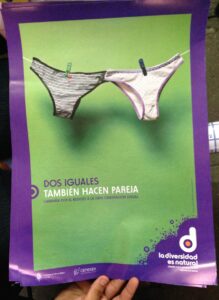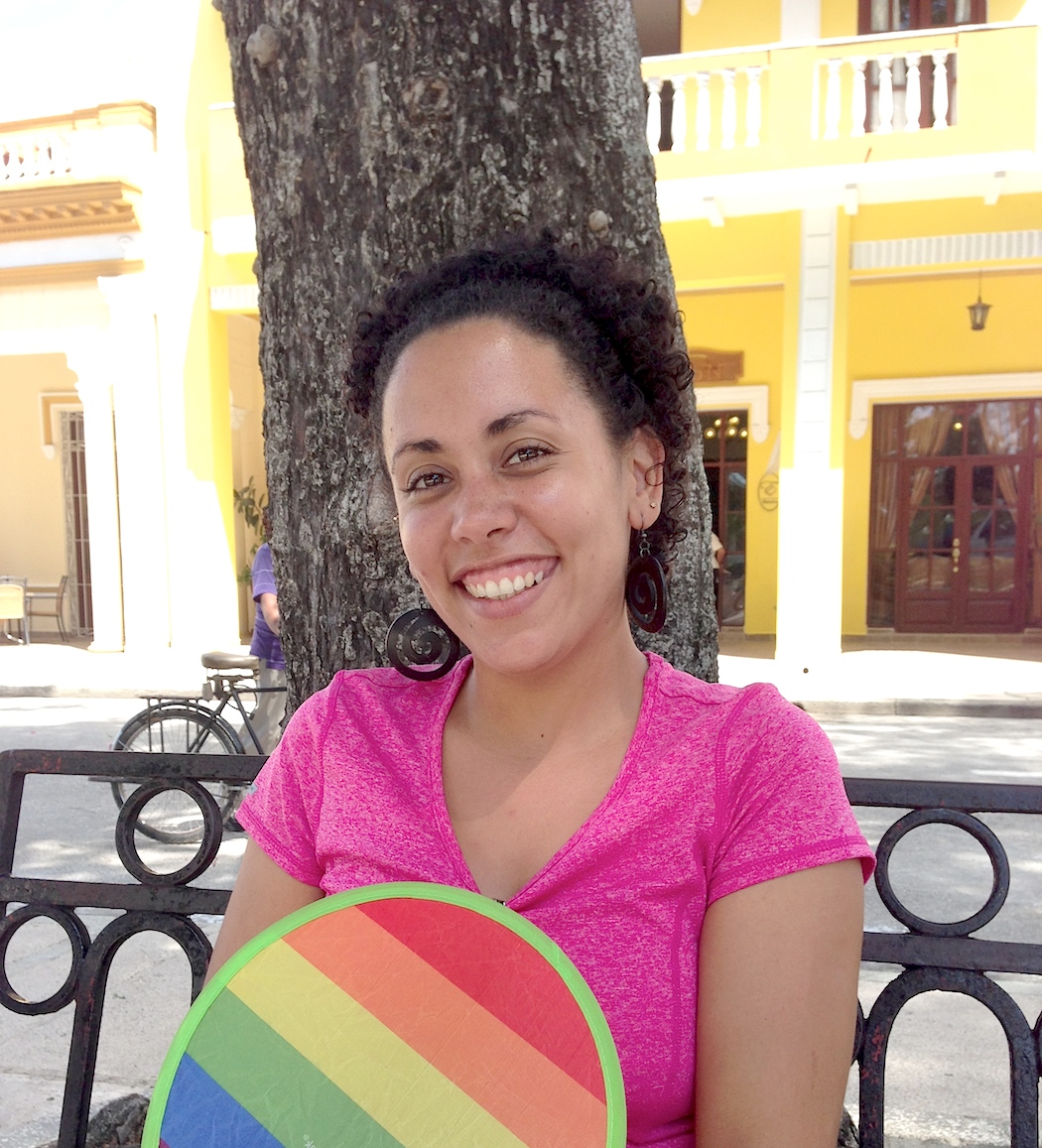Interview by Robyn Ochs (transcribed by Amanda Bernés and translated by Keja Valens)
In May 2014, I had the privilege of visiting Cuba as part of an LGBT-focused delegation. We visited several cities and over the course of 12 days participated in events related to the Jornada Contra la Homofobia (Day Against Homophobia) in Havana, Santa Clara and Bayamo. We participated in pride marches, conferences, panels and had the opportunity to spend time in conversation with LGBT activists. I asked some youth activists if they could put me in touch with a bi-identified woman who might be open to being interviewed, and they introduced me to Maria.
Robyn: For how long have you identified as bisexual?
Maria: It’s been about two years. It was in part a discovery process. Previously, I’d had only heterosexual relationships. I came to Havana to take a course for young Christians from all over Latin America and when I arrived, there were two girls who I thought looked at me strangely. I thought they didn’t like me. And, well, basically we went out dancing one night and one of them approached me and asked me to dance, and then the other one asked me to dance. I said no! Apparently, in other countries, people dance like that, women dance with women. That is very liberal. It’s almost never seen here. And, well, I started to spend time with one of them, and she captivated me, she drove me crazy. She was from El Salvador, and we started to talk and she told me she was a lesbian; she laughed with me and told me things. I was very taken, but also…? Sometimes it is difficult to take those steps, no?
Robyn: I hear you!
Maria: All changes take time and a great deal of transformation.
Robyn: Yes, there can be a huge gap between knowing and doing.
Maria: So finally I discovered, in part, what my feelings were for the girl. We had a relationship. I came back to Santiago, and I started to feel somewhat lonely, you know, because my group of friends is almost all heterosexual. Sometimes we need someone to talk to about what’s going on or to look at someone and be able to say, “I like that girl.” I live in a very macho and relatively homophobic province, and I was feeling a little locked in, no? In the closet. And then I went to another event where we were building group cohesion, and we had to choose a word that identifies us. There were various papers on the ground that said: Christian, Cuban, Gay, Lesbian, Revolutionary, Communist, and a variety of words like that. And I stood there looking at all of the words and I said: “Oh My God! There isn’t even a word for my identity.” I stayed staring ahead. There was a group of gay guys at the event. Two who were in a couple stood on the word Gay. The rest of the gay guys stood by the word Cuban and said to the couple, “How can you guys stay there on Gay? Can’t you see that everyone is looking at you? You have to change!” And one stayed and the other moved to the word Cuban. The one standing alone on gay started to cry. And it hit me…it broke my heart, and the guy started to cry and I started to cry behind him. And we looked each other and we cried and cried and cried, and people came over to me and asked, “But Maria, why are you crying?” And I said, “Because I’m bisexual and the word isn’t even here, and I feel excluded.” It was quite something! It was my coming out of the closet, as we say here. Since then, well, I’ve tried to find a relationship. I don’t just go out looking for partners, not that. The people who come into my life, God puts there. He finds them. They are this way. And, well, I have tried to be comfortable with myself, but I haven’t told my mother.
Robyn: You haven’t spoken with your mother?
Maria: No, but we have a relationship with a lot of trust and good communication. There are some things that don’t need to be said. She, by my actions, sees that I’m taking a position that is not totally… but not that I spend time with lesbians and am very involved in those movements.
Robyn: So she sees who you are?
Maria: Exactly! It’s the same for the Recommunication with Cuba, which is for the Church, and for the Martin Luther King Center, where we are supporting the fight against homophobia. We have had courses like “Sane Sex.” At the moment, I am in the process of filming a documentary with the group, “Las Isabellas.” That’s how I came to the group. I had heard about it. When I got close to Isel Calzadilla, the coordinator, a friend said to me, “A documentary has to be made about these women. People have to know the story of the women of Santiago de Cuba, how they got together, how they formed a group. It’s the first group—a support group.
Robyn: Yes, because they are making history right now!
Maria: Exactly. So I started working on the project, and my mother at first said, “What is this? You’re going to have to join.” Oh, yes, mom, don’t make a stink. And then, I don’t know. I think that parents, at least my mother, is very flexible, and she has a lot of respect for my life and my private life. I’m set with her. She is a human being, a person of integrity, a person of dignity, a person who respects the rights of others, and sexual orientation isn’t a determinant factor for her. So she respects me and she understands me. I’ve been this way for two years now.
Robyn: And how old are you?
Maria: 24.
Robyn: 24. And do you know other bi men or women?
Maria: Yes, I know one guy who works here in Santiago with men who have sex with other men. He works in health and in the program working to stop the spread of HIV/AIDS. And he has come out as bi. He says it, but there is still a lot of prejudice toward bisexuality, and sometimes you can see the discrimination. Even within gay groups because the lesbians might say: “They’re not like us; they’re something different,” and I don’t know but if you’re in between, come on, what are you? People seem to often have a lot of difficulty with the middle position. As if people are supposed to be either cold or hot.
Robyn: Is there pressure on you to identify as lesbian?
Maria: No, really I don’t feel like I have to identify myself as something specific. That is exactly the thing about bisexuality. Even yesterday, the girls talking with me last night, asked “Maria, who are you more attracted to, men or women?” I said to them, “It’s not about whether I’m more attracted to men or to women, because I like specific men and specific women. It’s about the beauty of the person, not the beauty of the sex.”
Robyn: When we were in Havana, I spoke with a man in a small LGBT group who said that two women in that group were bi but that they didn’t want to be identified as such.
Maria: Yes, sometimes people are very concerned about speaking and especially giving an interview because, how will that look? And then there’s also the reality that bisexuality is seen to be a lot like prostitution. Especially with foreigners. There are people who are seen during the day acting very hetero, very manly or very girly, and at night go to places…
Robyn: Yes, because there is a difference between identity and behavior. I’m wondering: have you ever had access to written materials about bisexuality?
Maria: I’ve never seen any. It’s one of the taboos. People know about it, people talk about it, but mostly about gays. The thing is that you see it, but the topic is rarely mentioned. When I attended that event in Cienfuegos with a group of Latin Americans, there were girls from Colombia and Costa Rica. I realized that I had a lot of freedom with my sexuality. I was surprised, yes. Because I thought that in those countries with Catholicism, religion would have a greater influence than in Cuba and that they would be behind us in terms of openness. But I found the girls to be super open. It’s a nice difference because we get to see that yes, other places are revolutionizing.
Robyn: The world is changing quickly around LGBT issues.
Maria: Yes, people are opening up and all that. Some are lagging, for example, older people who were educated in a different era, but now young people and kids… Young people are not only changing attitudes but also taking action. Almost all of the folks [at the conference] who came from Latin America were involved in social and community projects to support diversity. The El Salvadoran I knew had a project involving mini-works with a highly marginalized community. It’s excellent, and it helps a lot. Here, recently, the group “We Are” formed in the evangelical theological seminary. In other words the Church too is opening up.
Robyn: Maria, thank you so much for speaking with me.

Cuban LGBT educational poster: “Two of a kind also make a pair [a couple]”

